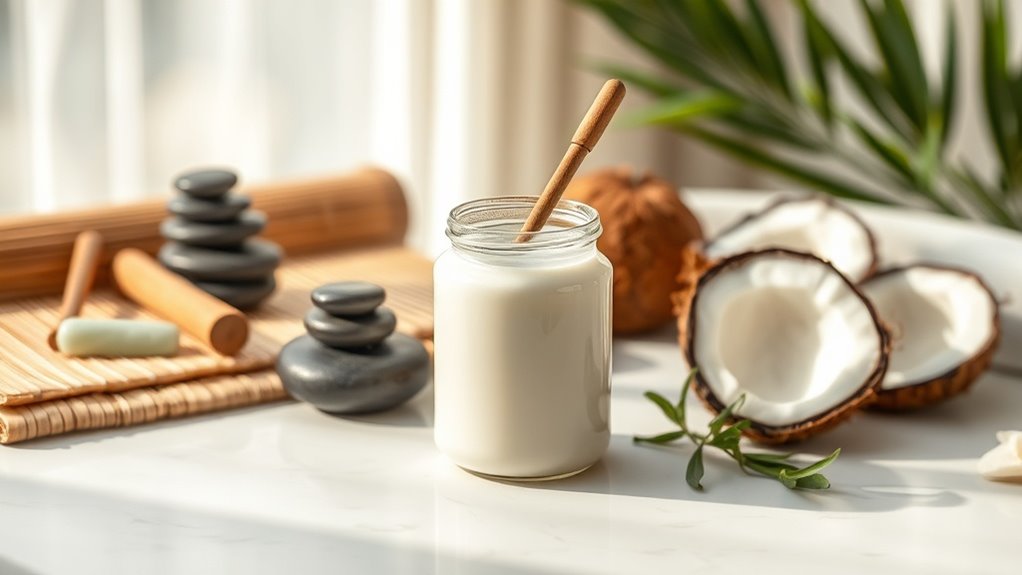Dry Cough Remedies Adults Use to Sleep Better
To stop nighttime dry cough and sleep better, try taking 2 teaspoons of honey before bed, using a cool-mist humidifier 3-4 feet from your bed, and elevating your head 15-30 degrees with extra pillows. Over-the-counter options like dextromethorphan can block the cough reflex, while antihistamines reduce postnasal drip. You’ll also want to avoid eating 3 hours before bedtime to prevent acid reflux. Understanding the specific cause of your cough leads to more targeted solutions.
What Causes Nighttime Dry Cough in Adults
Nighttime dry cough in adults commonly stems from several distinct pathophysiological mechanisms that tend to worsen during sleep.
You’ll often experience this irritating symptom due to postnasal drip, gastroesophageal reflux disease (GERD), or asthma. When you lie down, mucus accumulates in your throat, triggering the cough reflex.
Air pollution, allergies, and viral infections can also cause nighttime dry cough by irritating your airways. Incorporating natural cough remedies into your routine can offer significant relief during these episodes.
While searching for dry cough remedies for adults, it’s crucial to identify the underlying cause. Chronic conditions like bronchitis or ACE inhibitor medications may require specific medical interventions beyond standard remedies.
Natural Home Remedies for Dry Cough Relief
While conventional medications can effectively treat dry cough, several evidence-based natural remedies offer significant relief without pharmaceutical side effects.
You’ll find relief using honey, which studies show can suppress cough as effectively as dextromethorphan. Try consuming 2 teaspoons before bed.
Thyme tea’s expectorant properties help reduce coughing intensity, while ginger’s anti-inflammatory compounds soothe irritated airways.
Steam inhalation with essential oils like eucalyptus can moisturize dry airways and loosen mucus.
For immediate relief, salt water gargling reduces throat inflammation and triggers the cough reflex less frequently. Additionally, incorporating natural ingredients such as raw honey and lemon juice in a homemade remedy can enhance overall effectiveness.
Over-the-Counter Medications That Help
Three primary categories of over-the-counter medications effectively target dry cough symptoms.
When selecting a medication, you’ll want to choose based on your specific symptoms and timing of cough occurrence.
-
Antitussives (cough suppressants) like dextromethorphan work by blocking your brain’s cough reflex, particularly useful for nighttime relief.
-
Expectorants such as guaifenesin help thin mucus secretions, making coughs more productive and easier to clear.
-
Antihistamines including diphenhydramine reduce postnasal drip that triggers coughing, though they may cause drowsiness – beneficial for nighttime use but potentially limiting for daytime activities.
Lifestyle Changes to Reduce Coughing at Night
Making strategic adjustments to your nighttime routine and sleeping environment can significantly reduce dry cough symptoms that disrupt sleep.
Elevate your head with extra pillows to minimize postnasal drip and acid reflux. Keep your bedroom humidity between 40-50% using a humidifier to prevent airway irritation.
Don’t eat within 3 hours of bedtime to reduce acid reflux risk.
Remove dust-collecting items from your bedroom and vacuum regularly. Consider using hypoallergenic bedding to reduce exposure to allergens.
If you smoke, quit – as tobacco smoke irritates airways and prolongs coughing.
Stay hydrated, but limit fluids close to bedtime. Additionally, managing environmental triggers like dust and allergens can help minimize coughing by maintaining optimal indoor air quality.
Creating the Ideal Sleep Environment
Since a dry cough often worsens at night, optimizing your sleep environment becomes crucial for symptom management.
You’ll need to create conditions that minimize throat irritation and support respiratory comfort.
-
Maintain bedroom humidity between 40-50% using a cool-mist humidifier, positioning it 3-4 feet from your bed to prevent over-saturation.
-
Set your room temperature between 65-68°F (18-20°C) to reduce inflammation and promote better breathing.
-
Elevate your head 15-30 degrees using extra pillows or a wedge pillow to minimize postnasal drip and prevent acid reflux that can trigger coughing. Additionally, maintaining humidity levels in the home helps prevent congestion recurrence, contributing to a more restful sleep.
When to See a Doctor About Your Dry Cough
While most dry coughs resolve on their own within 2-3 weeks, certain symptoms warrant immediate medical attention.
You should consult your doctor if you experience coughing up blood, severe chest pain, difficulty breathing, wheezing, or fever above 101°F.
Additionally, seek medical evaluation if your cough persists beyond three weeks, interferes with sleep, or produces thick, discolored mucus.
If you have underlying conditions like asthma, COPD, or heart disease, don’t wait to get checked.
A chronic dry cough could indicate serious conditions such as pneumonia, bronchitis, or acid reflux requiring proper diagnosis and targeted treatment.
Prevention Tips to Avoid Nighttime Coughing
To minimize nighttime coughing episodes, you’ll need to implement several evidence-based strategies before bedtime.
Research shows that environmental and behavioral modifications can significantly reduce nocturnal cough frequency and improve sleep quality.
-
Elevate your head with extra pillows to maintain a 30-45 degree angle, reducing postnasal drip and acid reflux that trigger coughing.
-
Run a humidifier set to 40-60% humidity to prevent airway irritation and moisturize mucous membranes.
-
Clear your nasal passages with saline irrigation or nasal spray 30 minutes before lying down to reduce postnasal drainage. Incorporating natural antihistamine foods such as apples and berries into your diet can further help alleviate symptoms and promote better sleep.




